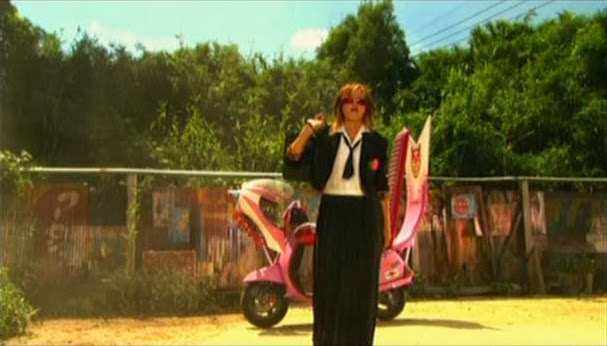(2004) Written and directed by Tetsuya Nakashima; Based on
the novel and manga by: Nobara Takemoto; Starring: Kyôko Fukada, Anna Tsuchiya,
Hiroyuki Miyasako and Sadao Abe; Available on DVD.
Rating: ****
“Humans are cowards in the face of happiness. You need
courage to hold on to happiness.” – Momoko Ryugasaki (Kyôko Fukada)
An oft-repeated Japanese adage proclaims, “The nail that
sticks out gets hammered down.” In a collectivistic
culture where harmony in the group is favored over individuality, attempts to
do your own thing are discouraged. Even
when such cultural mores are in place, there will always be people who survive
and thrive, bucking society’s trends.
Writer/director Tetsuya Nakashima’s endearing comedy (based on a
novel/manga by Nobara Takemoto) Kamikaze
Girls, chronicles the unlikely friendship between two counter-culture high
school girls who share a common disdain for the establishment.
Momoko (Kyôko Fukada) is a “Lolita,” modeling her look after
the fashion of the 18th-century French Rococo era. Ostentatious dress, replete with frilly
outfits and matching parasols, is de rigueur for the Lolita lifestyle. Momoko embodies the Rococo period, which
(according to her interpretation) was steeped in hedonism, long walks and
needlepoint. She’s content to immerse
herself in the fashion aspects, minus the hedonism, resolute in the assertion
that she was born, and will die alone. She
takes solace in spending her father’s ill-earned money, and frequenting the
chic Tokyo shop Baby, The Stars Shine Bright, which caters to the Lolita crowd. Her life is about to change, however, when
she encounters another girl with a similar, but divergent, disdain for her
mainstream peers.
At first glance, Ichigo (Anna Tsuchiya) is the polar
opposite of Momoko, with her frumpy outfit (purchased at JUSCO, Japan’s answer
to Walmart) and pugnacious demeanor. She’s
a “Yanki,”* typified by crude, brash behavior and a tendency to spit. She rides a souped-up scooter and hangs
around with an all-girls biker group, The Ponytails. Beneath her tough girl façade, lurks a
fragile interior, desperately trying to sublimate her origins as a meek, nerdy
schoolgirl.
* There are conflicting views about the word’s origin, and
whether or not “Yanki” is a bastardization of the American “Yankee.” You can find out more about Yankis, Lolitas,
and a few other select Japanese subcultures here.
Similar to their assumed identities, Momoko and Ichigo’s
family backgrounds couldn’t be more different.
Abandoned by her adulterous mother at the age of six, Momoko was raised
by her small-time hood father. After he’s
chased out of Tokyo by yakuza, they relocate 60 miles away, to rural Shimotsuma. They survive on his meager earnings from selling
cheap Versace knock-offs. By contrast,
Ichigo’s home life is more prosaic, stemming from an average suburban nuclear family. In theory, both girls should hate each other,
but each fills a void left by the other.
Perhaps embodying the aphorism, “the enemy of my enemy is my friend,”
they find friendship in a world that has no use for them. Ichigo’s comment, “You may be in a frilly
dress, but you do have guts,” sums up their relationship, acknowledging that Momoko’s
dainty exterior belies her courageous heart. Ichigo’s rough-and-tumble shell hides a
vulnerable adolescent girl who wants to be loved and accepted.
Kamikaze Girls
boasts a cast of colorful supporting characters, including Hiroyuki Miyasako as
Momoko’s (in her words) “useless” father.
He’s constantly looking for the next big score, but only manages to
shamble from one pathetic scheme to another.
Another small-time criminal, Ryuji “the Unicorn,” (Sadao Abe, who plays
a dual role as the gynecologist who delivers baby Momoko), haunts the pachinko
parlors and wears his hair in a freakishly long, phallic pompadour (insert
Freudian interpretation here). Yoshinori
Okada plays the gaudily dressed owner/resident fashion designer at Baby, The Stars
Shine Bright, and takes a shine to Momoko’s gift for embroidery.
Kamikaze Girls is
a story of love and friendship, told with wit and heart. Nakashima uses a broad pastiche of styles for
his palette, including an animated sequence in the middle, to keep things
lively. He displays genuine affection
for Momoko and Ichigo by refusing to dwell on their outsider status. Instead, he channels the film’s energies into
showing the protagonists establishing their respective sense of self. I hesitate to call this a “coming of age”
story – that would be too marginalizing. The themes presented here are applicable
to anyone who has ever experienced an identity crisis. It’s about being comfortable in one’s own
skin, and having the freedom and strength of conviction to be who you are. One of the gifts of experiencing a meaningful
friendship is being able to let your guard down, and reveal who you truly are.







No comments:
Post a Comment